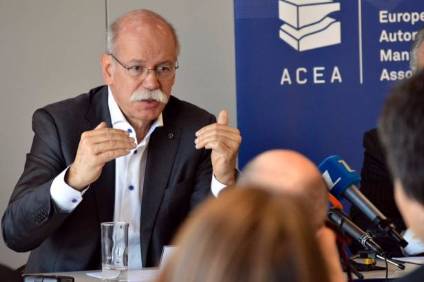
In what looks like a pre-emptive strike ahead of European Commission proposals, Europe’s carmakers have proposed a further reduction to fleet average CO2 targets by 2030, but also said they can only be achieved with much higher take-up of electric vehicles and the provision of battery charging infrastructure.
The European Commission is expected to reveal its proposal on CO2 targets for cars post-2021 later this year.

Discover B2B Marketing That Performs
Combine business intelligence and editorial excellence to reach engaged professionals across 36 leading media platforms.
At the Frankfurt Motor Show today, the European Automobile Manufacturers’ Association (ACEA) proposed a 20% CO2 reduction for passenger cars by 2030, compared to 2021. “This is a steep reduction,” said ACEA President, Dieter Zetsche. “It’s also in line with what is expected of other industry sectors, as well as the EU Climate and Energy Framework and the global Paris agreement.”
The Frankfurt Show has been dominated this year by electrification and ACEA said that take-up of electrical vehicles – and achieving the 2030 CO2 target – is dependent on the provision of charging infrastructure.
ACEA said the CO2 target should be conditional on the real market uptake of electrically-chargeable vehicles and the availability of charging infrastructure for alternatively-powered vehicles – which are crucial to achieve any significant CO2 reductions beyond 2020 levels. Concretely this means that, based on a mid-term review in 2025, this target could be adapted either upwards or downwards, ACEA said.
“In our opinion, this conditionality principle links Europe’s long-term climate objectives to the reality of the market,” Zetsche said. “Currently the reality is that the market uptake of electrically-chargeable vehicles is low – and this is not due to lack of availability and choice.”
The latest ACEA data show that in the first half of 2017 electrically-chargeable vehicles made up 1.2% of total new car sales. Alternative powertrains will undoubtedly play an increasing role in the transport mix, and all ACEA’s members are investing heavily in them. However, equally important is that all EU member states start delivering on their commitments to step up investments in the necessary recharging and refuelling infrastructure.
In the interim, modern diesel technology will continue to play an important role in the gradual transition to low-carbon vehicles, ACEA said.
Zetsche added: “The latest generation of diesel vehicles is a very effective lever to achieve climate goals in the near future, because they emit 15-20% less CO2 than equivalent petrol vehicles.
“Our industry is committed to being part of the solution when it comes to decarbonising road transport, while at the same time reducing pollutant emissions.”
Automakers have long complained of high costs associated with powertrain investments to meet tough CO2 targets. The switch to electric from fossil fuel burning tech will also involve high levels of investment.






